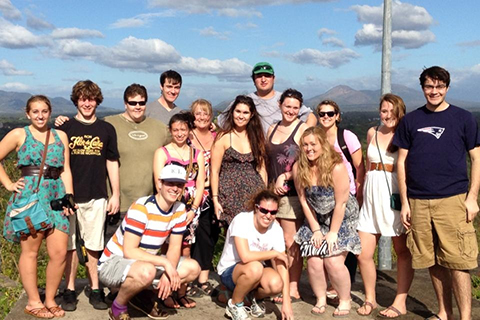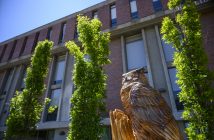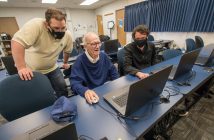Civic engagement efforts on campus help students grow ‘habits of engagement’ to better their world.
When you talk about civic engagement these days, you are not just talking about the kind of community service in which a student goes off into the community to do good work.
You’re talking about partnerships between students and the regional and global communities in which they learn. The scope of civic engagement has broadened; it now includes working with community organizations to identify their needs—and then help fill them.
So says Dr. Marsha Marotta, dean of Undergraduate Studies, who is working to make sure that Westfield State is keeping up with these important trends.
Dr. Marotta was instrumental in seeing that Westfield State secured a $148,000 state grant from the Department of Higher Education (DHE) last fall (see sidebar on Page 9 ) that will make possible a rapid expansion of longstanding civic engagement efforts on campus.
She is also enmeshed in the work on the state level.
Since last fall, Dr. Marotta has served as part of a DHE study group on civic engagement made up of about a dozen faculty and administrators from the 29 public campuses across the state. The study group will make recommendations to the state Board of Higher Education in the fall for implementation of civic engagement practices statewide.
At Westfield State, Dr. Marotta says, “Our goal is to have every student take at least one course that has a substantial pedagogy of civic learning and democratic engagement beginning with the class of 2016.”
The learning components of the grant are based around identifying and filling needs in the community. According to Dr. Marotta, one kind of course the University could develop using the state funds involves students working in partnership with area organizations to identify and solve problems.
For instance, students could work with a grammar school to identify safety hazards on the school playground or in the traffic flow for school buses; then, University students would tackle those problems with the elementary school students and navigate the political processes to create positive change. Both sets of students learn from this.
“We want students to get involved and stay involved in their communities,” Dr. Marotta says. “I hope they will understand the points of access in our system of government and how they can create change. We want to give students the tools to make a positive, tangible difference now and help them develop lifelong habits of democratic engagement.”
Dr. Marotta says some students have suggested the University make civic engagement a graduation requirement, and the campus-wide Advisory Committee on Civic Engagement that President Evan S. Dobelle created this year will look at that suggestion.
Nancy Salvidio, the associate vice president for Alumni and Community Relations, defines “civic engagement” as “an umbrella term for the activities that promote the bridging of communities with socially-conscious thought and action.” To Salvidio, civic engagement embraces experiential learning opportunities that provide those involved to become ethically-aware and community-responsive through political and non-political processes.
“It is the active and participatory focus to prepare learners for global citizenship,” she says.
“For higher education to be a leader in civic engagement, it needs to provide a relevant definition with clear civic learning outcomes,” Salvidio adds. “Civic engagement must be embraced in the curriculum and have strategic goals in non-academic learning objectives. We have a responsibility to ‘pay it forward’ and share our knowledge and values to make a difference in the lives of our students if they are to become critically-minded, global citizens.”
Dr. Susan Leggett, the new faculty director for civic engagement activities on campus, points out that the University’s commitment to service learning is not new for Westfield State.
It goes back through the University’s 175 years to founder Horace Mann.
Civic engagement, she says, has long been an integral part of the campus’ mission and focus. And now, the University has the unique opportunity to grow that mission.
What’s most exciting about the development of the civic engagement program, Dr. Leggett says, is having the chance to arrange collaboration among faculty members so they can share ideas.
“It’s really bringing people together to share their work,” Dr. Leggett says, noting that members of the advisory committee are studying best practice documents to share with interested faculty.
“This will benefit students by providing them with opportunities to have a full experience that links their academics to their everyday lives,” she says.
“We want to show students that what’s happening in the world makes a difference to them and to show them how they can make a difference in the world.”
Faculty and staff at Westfield State have much experience to share in the civic engagement arena.
Alumni are also well-known for giving back.
Dr. Leggett points out that 2013 is the Alumni Year of Service, in which alums are being encouraged to let the University know when they take part in civic engagement opportunities.
“This is a wide movement,” Dr. Leggett says. “We want our students to see themselves as agents of change and to really make a difference in the world. We’re really interested in building partnerships with organizations in the community so we can learn what they need from us and to really have a full opportunity to make our contributions meaningful.”




